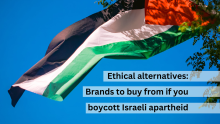In the past year Barclays has been a key target of Palestinian human rights campaigners because of its investments in a range of companies that supply weapons, components and military technology to the Israeli government. Key among these was Elbit Systems.
The key campaign organisations that targeted Barclays are direct action network Palestine Action and Palestine Solidarity Campaign (PSC) which called for a boycott of the company.
The Palestinian Boycott, Divestment and Sanctions (BDS) National Committee also called for divestment campaigns against Barclays.
Bankrolling of genocide by Barclays
In June 2024 PSC, Campaign Against Arms Trade, and War on Want published a joint report documenting Barclays' "Bankrolling [of] genocide and apartheid".
It showed that the bank held over £2bn in shares, and provided £6.1bn in loans and underwriting, to "9 companies whose weapons, components, and military technology are being used by Israel in its attacks on Palestinians."
According to Palestine Action, “the latest U.S. Securities and Exchange Commission (SEC) filings, Barclays owned 0 shares in Elbit Systems Ltd (ELST), down 16,345 since the previous filing, 15th May 2024, worth over $3,400,000”.
Direct action and boycott campaigns
Palestine Action took direct action against Barclays premises across the UK 54 times in the past year. This included "Smashing branch windows and spraying them in blood-red paint", and "many of these actions put Barclays sites out of operation for weeks, actions which sought to raise the costs associated with dealing with Elbit".
Palestine Solidarity Campaign called on “people to boycott all Barclays services until the bank ends its complicity in Israel’s attacks on Palestinians.” It claimed that nearly 4000 people closed their Barclays accounts as part of its “mass account closure” campaign days.
What’s next for the Barclays boycott?
It appears that this divestment from Elbit will result in an end to the direct action campaigns against the company from Palestine Action.
PSC however says it is continuing with its boycott campaign against Barclays.
Barclays is likely to still hold shares in other complicit companies.
PSC Campaigns Officer Lewis Backon told Ethical Consumer, “This could indicate the start of a permanent divestment and that shows the power of our movement, but we can’t let Barclays off the hook. We must keep up the pressure and not allow the campaign to be derailed.
“We are therefore calling for continuing boycotts, protests and pickets calling for Barclays to permanently divest from all companies arming Israel's genocide.”
Previously when HSBC’s investments in Elbit were highlighted by campaign organisations including War on Want and PSC, resulting in HSBC's divestment from Elbit in 2018, the campaigns against the company significantly reduced.
UPDATE: Barclays acquires Tesco Bank
According to Palestine Solidarity Campaign (PSC), "On 1 November 2024, Barclays acquired ownership of Tesco Bank. This means that Barclays owns and is operating under the Tesco Bank brand. We are therefore calling on all Tesco Bank customers to shut their accounts as part of the boycott of Barclays." We've therefore added Tesco Bank to our list of active boycotts.







